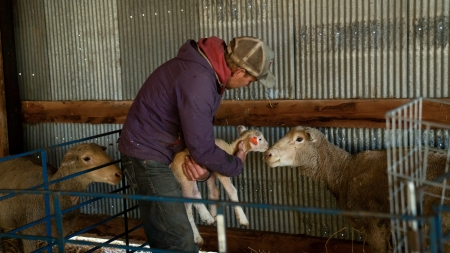Doing the Work
Not totally relating to some forms of climate activism, Josh Wharton found his own way to contribute.
From a large corral, Craig Scariot and I lead a flock of stubborn new lambs into a sorting chute. I carefully grab each lamb, and wrap it in a bear hug, but generally receive some furry wrestling in return. I quickly realize that putting my entire weight, and face, into the lambs’ mud-caked wool is the best method. Most still try to wriggle free, but eventually, each lamb calms down and holds still. At this point, Craig expertly squirts a deworming solution into their mouths, necessary medicine for maintaining animal health and avoiding the introduction of parasites into the existing stock. We repeat this process for each lamb, and by the time we break down the metal corral and send the lambs back out to pasture, I’m exhausted. I drive home, my volunteer work done for the day. Craig stays on, with more tasks to do and more animals to attend to. The work on a small farm is never really finished, and Craig hasn’t taken a vacation in three years.
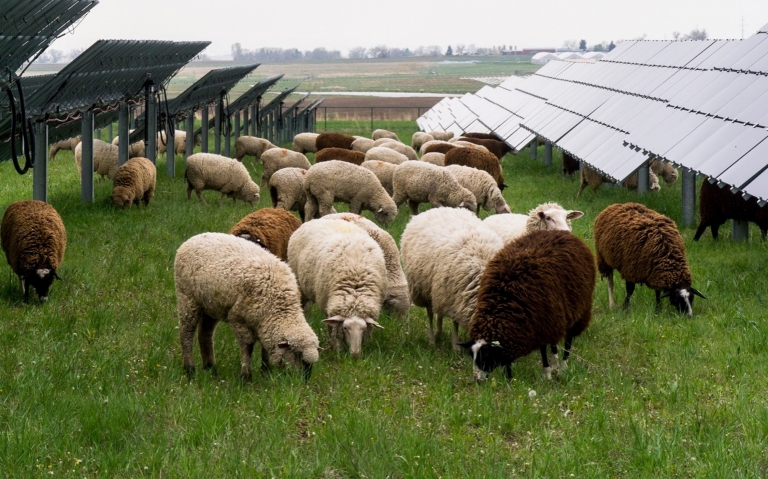
Sheep graze among the solar panels located in Colorado’s Front Range. Photo: Craig Scariot
Life as a small farmer is hard and full of endless physically demanding and difficult work. Those who do it have to love it. A few years ago, Craig left a lucrative career in money management to start SkyPilot Farm in Longmont, Colorado, with his partner Chloe Johnson. I knew Craig through mutual friends in the climbing world, and his decision both inspired and impressed me. He was following his passion, without prioritizing money or security. As a full-time climber, I could relate. But when Craig and Chloe started SkyPilot, it was for more than just their own personal happiness. The small run-down farm they purchased came with hard, dry dirt and infinite projects. It’s also located within spitting distance of bustling downtown Boulder and the urban sprawl that now penetrates every corner of Colorado’s Front Range. Yet, Craig and Chloe were able to save 43 acres from commercial development. They also started practicing regenerative grazing and built a program for community engagement and education. Insects and birds returned to their fields, and frogs began croaking in the creek again.
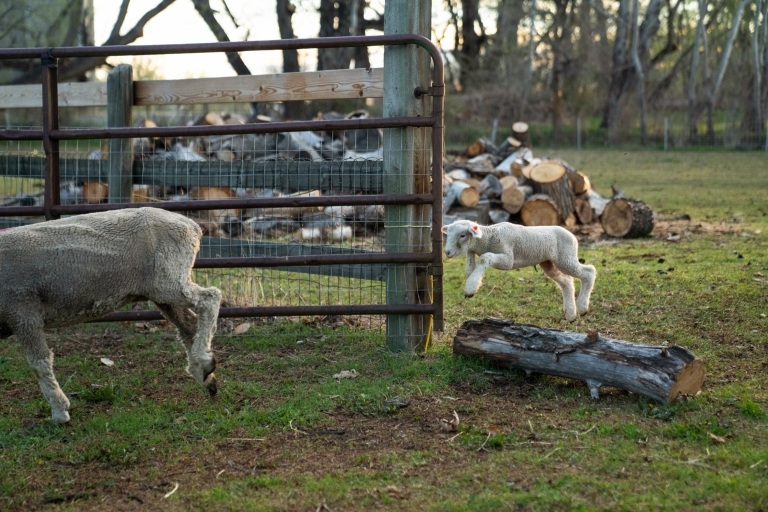
Learning how it’s done. Photo: James Lucas
Through agreements with private landowners focused on regenerative land management, SkyPilot is now grazing on more than 700 acres. More people from Boulder and the surrounding area are taking the time to get their lamb, pork and eggs from a place they can trust, and sales have doubled to tripled every year since the farm’s inception. SkyPilot is even helping manage vegetation by having their sheep graze in areas that house Front Range solar arrays, eliminating the need for carbon-intensive mowing.
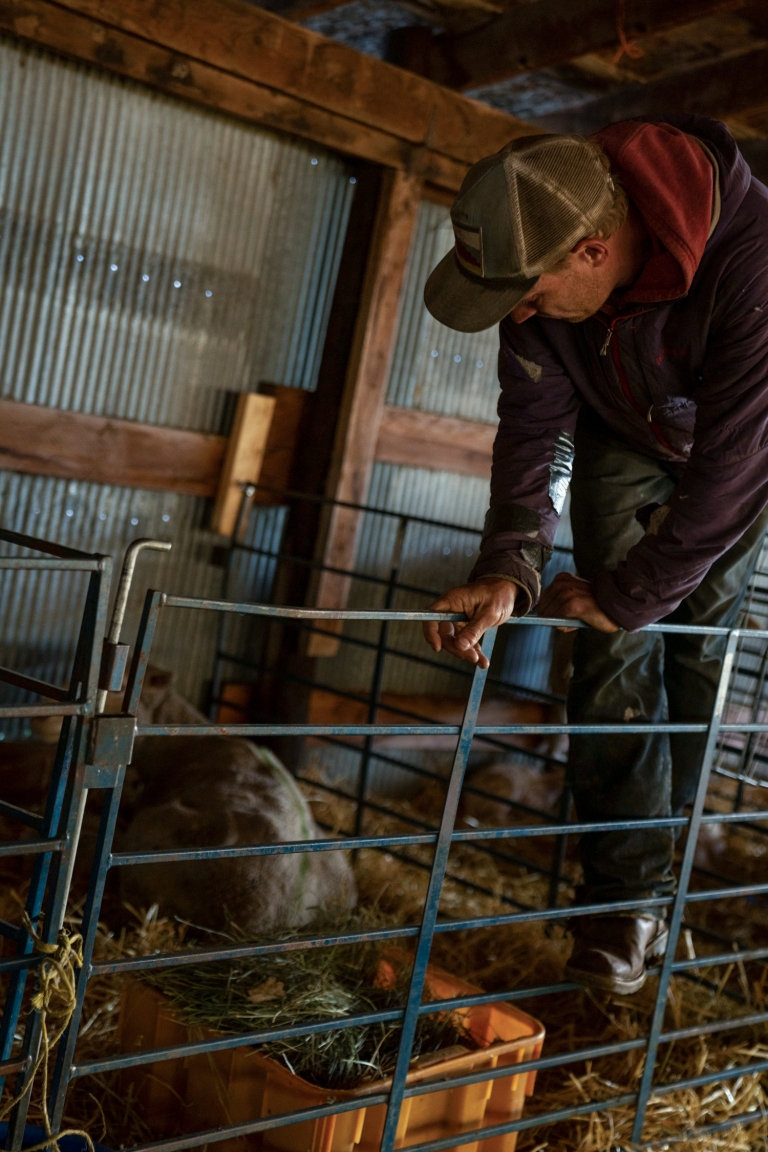
There’s always more work to be done. Josh Wharton does his part to help with some farm chores. Photo: James Lucas
Three years ago, Yvon Chouinard changed Patagonia’s mission statement and asked everyone associated with the company to step up our efforts to address the climate crisis. I struggled to come up with something that felt right. I wanted to contribute but didn’t quite know how. Getting on a carbon-spewing airplane to attend a climate march didn’t feel right to me. Announcing my views on Instagram seemed problematic, especially when research suggests that social media tends to deepen entrenched opinions, rather than shift them. It’s not to say that these things can’t be worthwhile, and in fact, some recent studies show that when around 25 percent of a group takes a stand on an issue, change is likely to occur.
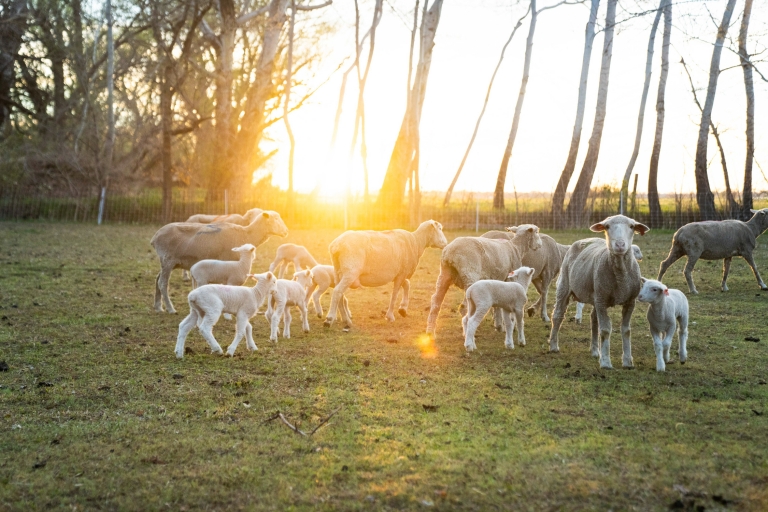
Golden-hour roaming. Photo: James Lucas
What I wanted to do was something that required some level of personal sacrifice on a consistent basis. I wanted my contribution to be uncomfortable, to hurt me a little, the way my actions, choices and participation in our society hurt the planet a little every day. When I finally thought of helping Craig and Chloe, the idea instantly felt right. Moving fencing, collecting eggs, shoveling shit out of chicken coops and deworming lambs aren’t exactly “rest day” activities, but I knew they did some measurable, albeit tiny, bit of good.
Taking a broad view of the startling statistics associated with the climate crisis, it’s easy to become disillusioned and cynical or want to throw up your hands and decry that nothing but systemic policy change will make a difference. Sure the world is increasingly global, and each of us is a single individual among billions. But our lives are still largely moved and shaped by our immediate circles. If we surrender to the cynical notion that our individual actions mean nothing or put all our energy into singular, slow-moving, large-scale solutions, we risk becoming joyless, uninspired and destined for inaction—at least that’s how it feels to me. The things we see and do that are right in front of us, like Craig and Chloe’s work on the farm, provide hope and empowerment and could ultimately inspire our friends and neighbors. In turn, that can slowly inspire a shift in culture, until we are all collectively accountable as good stewards of our planet.
In the last year, I’ve spent more than 20 days at the farm. The work is never easy and comes with no more than a simple “thanks” and the occasional carton of eggs, but somehow, it feels right. The quiet action of showing up and simply helping feels concrete and genuine, never performative. I’ve barely scratched the surface of what there is to learn, but one thing I am discovering is that small farms like SkyPilot feel like an important bridge between where we are and where we ultimately need to be—a loop backward in order to move forward.
